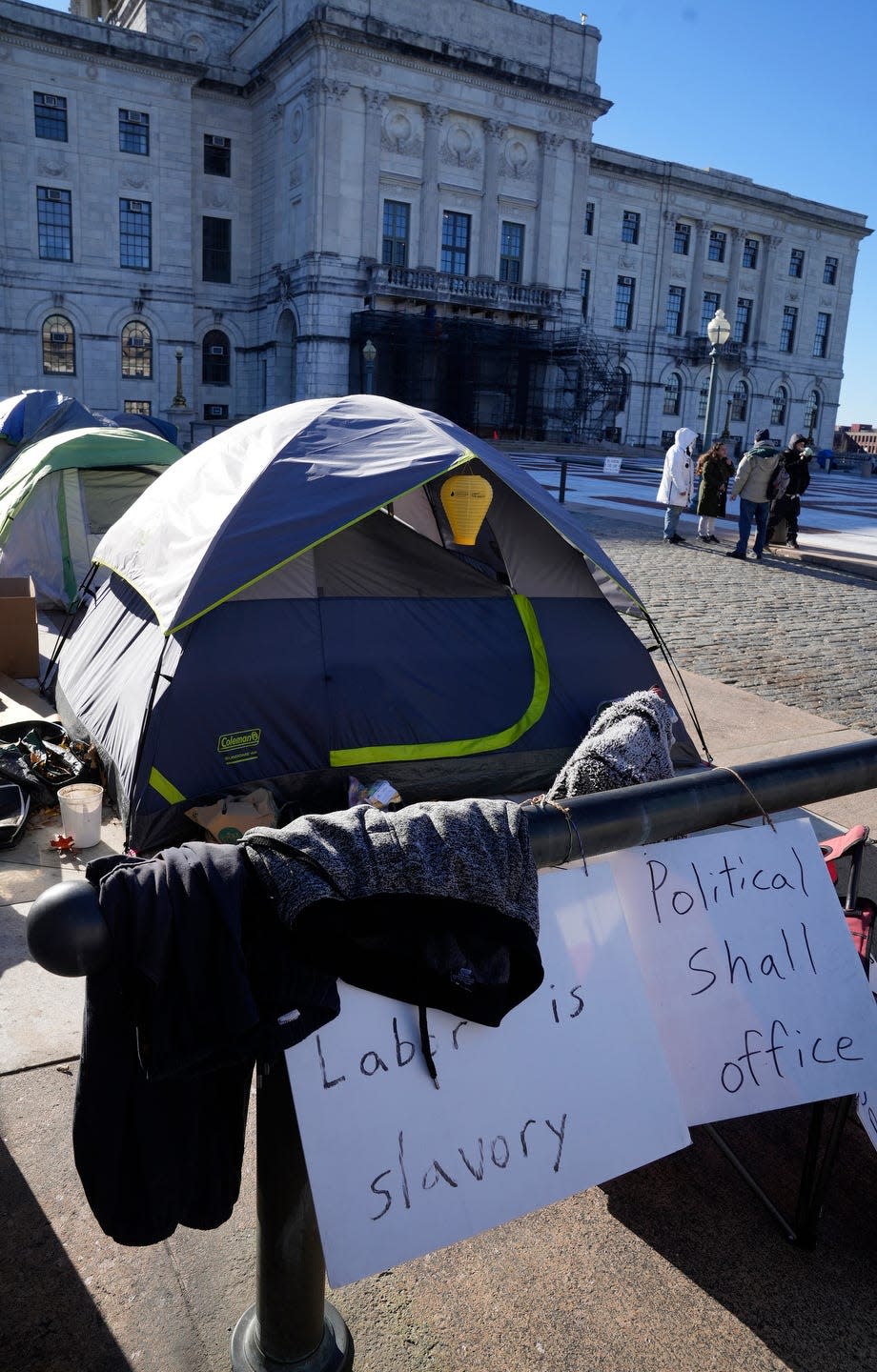RI's 'housing czar' at center of tension between homeless advocates and RI government
PROVIDENCE – The Rhode Island Coalition to End Homelessness is standing behind its count of Rhode Islanders lacking shelter in response to a sharply worded letter from state Secretary of Housing Josh Saal.
Saal sent the coalition a letter dated Dec. 15, “formally requesting” “real time” information about people living outside, the locations of 80 encampments throughout the state, and the waiting list for shelter beds – all due by 4 p.m. Monday, Dec. 19.
“The state needs to have access to on-the-ground real-time information regarding unsheltered homelessness in order to budge and quickly shift resources towards high-need areas in a responsive manner. Ultimately, our goal is to effectuate policies and practices that make homelessness rare, brief and non-recurring,” Saal said in the letter first reported by Bill Bartholomew, producer of The Bartholomewtown Podcast. “Our expectation is that all of our homeless service providers will continue to work hand-in-hand with us towards this goal.”
Gov. Dan McKee appointed Saal as the state's first "housing czar” in December 2021, a new $170,000 deputy secretary of commerce and housing post within the Executive Office of Commerce. In July, Saal – whose name has morphed into a recent rallying cry “Josh Saal. Do your job!” – took the title of Secretary of Housing.

Saal’s letter to the coalition came after Gov. Dan McKee publicly questioned the accuracy of the homeless numbers tracked by the coalition, the lead for the state’s Homeless Management Information System and the Coordinated Entry System. A federally funded initiative, coordinated entry helps service providers to prioritize shelter based on need to ensure that those who need help the most, get help first, and connect people with needed assistance.
“The coalition stands behind the accuracy and reliability of the data contained in the HMIS database,” Caitlin Frumerie, executive director of the coalition, wrote to Saal.
Frumerie emphasized that the agency securely maintains the personal information of people who are homeless and records every call made to the help center in the Coordinated Entry System. Its mandated reporting to the U.S. Department of Housing and Urban Development has been found to contain few errors, the agency said.
(The coalition has contracted with the state to oversee the HMIS for $587,800 and the Coordinated Entry System for $312,500 for the current fiscal year, according to the state Department of Administration.)
“As you are aware, the state of Rhode Island has seen a dramatic increase in homelessness – particularly unsheltered homelessness – since the start of the COVID-19 pandemic. Since the spring of 2020, Rhode Island has weathered a sharp economic downturn, rising housing and utility costs and historic year-over-year inflation in the cost of food, clothing and other basic necessities of life. These adverse impacts have placed an incredible strain on Rhode Islanders living on the margins,” Frumerie said.

Advocates for the homeless community have pushed for McKee to declare homelessness in Rhode Island a State of Emergency and to reenact Interagency Council on Homelessness to develop a state plan to address people lacking housing.
She expressed gratitude for the state’s move to mobilize 350 shelter beds, some of which are still coming online, and to activate the National Guard to help oversee a 24-hour "warming station" with 60 beds for people living on the street.
But Frumerie rejected suggestions that the coalition kept precise locations of an estimated 80 encampments scattered across the state based on a survey done in coordination with outreach workers this fall.
“As we have reaffirmed repeatedly, the coalition does not possess the exact location or geolocation coordinates of homeless encampments in Rhode Island. On each occasion you have requested this information, we have stated that the coalition does not have this information in its possession, custody, or control,” Frumerie said, adding that the agency had redirected to contact street outreach providers who work daily with the vulnerable population.
She expressed reservations, too, about providing encampment location to the government, as it could lead to camps being disbanded and people being targeted and victimized.
“Many have expressed concern that sharing or tracking encampment location information in HMIS will result in unintended harm to the persons residing outdoors (e.g., residents may be evicted with no place to go, targeted or [their identities] shared publicly through a Freedom of Information Act request),” she said.
As to Saal’s request for the coordinated entry “waiting list,” Frumerie reiterated a commitment to working collaboratively with the state to resolve the housing crisis.
“We also do not want Rhode Islanders living outside, particularly in this cold weather. However, we cannot, because of federal law and regulations, and social-justice reasons, allow persons residing at a specific encampment to 'cut the line' in front of other unsheltered Rhode Islanders who are of higher acuity. This prioritization process, mandated by law, is intended to ensure those who are most likely to die outdoors are prioritized first for any available resource or shelter bed,” she said.
As of Dec. 10, 509 people in Rhode Island were lacking shelter, up from 385 the last week of November, the apparent rise believed to be an anomaly due to the Thanksgiving holiday, when families temporarily gather, according to the latest figures.
The exchange of letters comes less than a week after Superior Court Judge David Cruise gave the state the go-ahead to clear an encampment from the State House plaza. Cruise rejected arguments that the people occupying the tents were exercising their First Amendment rights to protest in support of homeless Rhode Islanders.
Cruise said there were "ample, alternative channels" for the protesters to make their point without sleeping on the State House grounds, and that evicting them would not violate their First Amendment rights or the state's own Homeless Bill of Rights.
The state affiliate of the American Civil Liberties Union and the Rhode Island Center for Justice, which represented the campers, has not yet determined whether it will appeal.
In the meantime, even as hopes for a pallet housing village to temporarily house the unsheltered failed to materialize, Frumerie said the Coalition remains eager to help address the crisis.
“Our hope is that we can work together to do what we can this winter and immediately begin planning for next winter so we do not end up in this same place again next year,” she said.
This article originally appeared on The Providence Journal: Exchange of letters marks tensions over homelessness crisis

